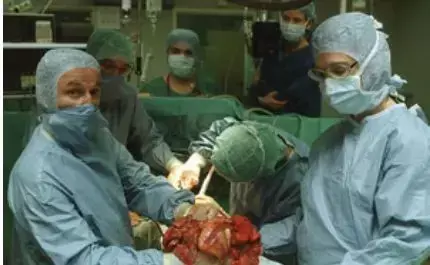- Home
- Medical news & Guidelines
- Anesthesiology
- Cardiology and CTVS
- Critical Care
- Dentistry
- Dermatology
- Diabetes and Endocrinology
- ENT
- Gastroenterology
- Medicine
- Nephrology
- Neurology
- Obstretics-Gynaecology
- Oncology
- Ophthalmology
- Orthopaedics
- Pediatrics-Neonatology
- Psychiatry
- Pulmonology
- Radiology
- Surgery
- Urology
- Laboratory Medicine
- Diet
- Nursing
- Paramedical
- Physiotherapy
- Health news
- Fact Check
- Bone Health Fact Check
- Brain Health Fact Check
- Cancer Related Fact Check
- Child Care Fact Check
- Dental and oral health fact check
- Diabetes and metabolic health fact check
- Diet and Nutrition Fact Check
- Eye and ENT Care Fact Check
- Fitness fact check
- Gut health fact check
- Heart health fact check
- Kidney health fact check
- Medical education fact check
- Men's health fact check
- Respiratory fact check
- Skin and hair care fact check
- Vaccine and Immunization fact check
- Women's health fact check
- AYUSH
- State News
- Andaman and Nicobar Islands
- Andhra Pradesh
- Arunachal Pradesh
- Assam
- Bihar
- Chandigarh
- Chattisgarh
- Dadra and Nagar Haveli
- Daman and Diu
- Delhi
- Goa
- Gujarat
- Haryana
- Himachal Pradesh
- Jammu & Kashmir
- Jharkhand
- Karnataka
- Kerala
- Ladakh
- Lakshadweep
- Madhya Pradesh
- Maharashtra
- Manipur
- Meghalaya
- Mizoram
- Nagaland
- Odisha
- Puducherry
- Punjab
- Rajasthan
- Sikkim
- Tamil Nadu
- Telangana
- Tripura
- Uttar Pradesh
- Uttrakhand
- West Bengal
- Medical Education
- Industry
Inferior outcomes tied to graft reduction surgery after lung transplants,finds study

Recent research has confirmed that Graft reduction surgery in lung transplant recipients is associated with lower pulmonary function and poorer overall survival. It has further been elaborated that , it does allow transplantation in prioritized recipients for whom it might otherwise be impossible to find an organ of suitable size. The findings have been published in European Journal of Cardio-Thoracic Surgery.
Since the first successful lung transplant 30 years ago, lung transplantation has rapidly become an established standard of care to treat end-stage lung disease in selected patients. Advances in lung preservation, surgical technique, and immunosuppression regimens have resulted in the routine performance of lung transplantation around the world for an increasing number of patients, with wider indications. Despite this, donor shortages and chronic lung allograft dysfunction continue to prevent lung transplantation from reaching its full potential. It is well documented that Implanted lung volume-reduction surgery due to donor/recipient size mismatch could affect both lung function and survival. So, in the recent study, Researchers examined the outcomes of lung volume-reduction procedures post-lung transplant.
Regarding the study design,the research team retrospectively reviewed 366 consecutive adult lung transplants carried out between January 2014 and December 2018 at one single centre. Patients were divided into either a non-reduced-size lung transplant or a reduced-size lung transplant (RT) group. To adjust for covariates, a propensity score analysis was performed. Survival was estimated using the Kaplan–Meier method. Differences were considered significant with P-values <0.05.
Results highlighted some interesting facts.
- In the RT group, 45 patients (12.3%) had some type of graft reduction surgery: 31 (68.9%) patients had pulmonary lobectomies and 14 (31.1%) wedge resections. Of the total cohort, 30 patients (8.2%) were prioritized, 23% of whom required graft reduction surgery. The propensity score analysis matched 41 patients in each group.
- In the RT group, there was an increased need for cardiopulmonary bypass (P = 0.017) during surgery and extracorporeal membrane oxygenation (P = 0.025) after lung transplant.
- Furthermore, the median length of mechanical ventilation was higher (P = 0.008), and lung function at discharge, 3 and 6 months post-lung transplant was significantly lower in the RT group (P < 0.05).
- Survival analysis demonstrated a significantly poorer overall outcome at 1, 3 and 5 years post-lung transplantation in patients with a reduced graft (P = 0.007), while the 1-year conditional survival was also worse in this group (P = 0.025).
- For full article follow the link: https://doi.org/10.1093/ejcts/ezab234
Primary source: European Journal of Cardio-Thoracic Surgery
Dr Satabdi Saha (BDS, MDS) is a practicing pediatric dentist with a keen interest in new medical researches and updates. She has completed her BDS from North Bengal Dental College ,Darjeeling. Then she went on to secure an ALL INDIA NEET PG rank and completed her MDS from the first dental college in the country – Dr R. Ahmed Dental College and Hospital. She is currently attached to The Marwari Relief Society Hospital as a consultant along with private practice of 2 years. She has published scientific papers in national and international journals. Her strong passion of sharing knowledge with the medical fraternity has motivated her to be a part of Medical Dialogues.
Dr Kamal Kant Kohli-MBBS, DTCD- a chest specialist with more than 30 years of practice and a flair for writing clinical articles, Dr Kamal Kant Kohli joined Medical Dialogues as a Chief Editor of Medical News. Besides writing articles, as an editor, he proofreads and verifies all the medical content published on Medical Dialogues including those coming from journals, studies,medical conferences,guidelines etc. Email: drkohli@medicaldialogues.in. Contact no. 011-43720751


